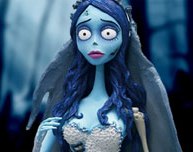 I know you were brought in late on [Tim Burton’s Corpse Bride](http://imdb.com/title/tt0121164/)
I know you were brought in late on [Tim Burton’s Corpse Bride](http://imdb.com/title/tt0121164/)
and from what I gather, weren’t responsible for much
of the story, but I’m curious about your thoughts on
one particular story element.
Is the ending a happy one for Victor?
The way it plays, it seems as though it is intended to
be a happy ending for him when he winds up with
Victoria, but from the audience’s perspective, I’m not
sure we see evidence that he would be happier with
Victoria than he’d be with the Corpse Bride. The
inclusion of the scene where Victor connects with the
Corpse Bride while playing piano with her is of course
necessary to propagate the plot, but seems to indicate
that he’d be just as content living among the dead as
he would be with Victoria.
— Rob
Los Angeles
You point out one of the real challenges with Corpse Bride. Generally in a fairy tale like this, you’d be really clear about which woman the hero is “supposed to” be married to at the end.
At the start of the movie, it seems pretty straightforward: Victor meets Victoria, and both of them are surprised how much they like each other. Corpse Bride seems like a monster when she first appears, but is quickly revealed to be funny and sweet. She’s rotting, but not rotten.
As we worked on the story, Corpse Bride kept becoming more and more likable, to the point where we started to wonder exactly the question you ask, “Shouldn’t, maybe, Victor end up with Corpse Bride?”
The solution wasn’t to diminish Corpse Bride, but rather to beef up Victoria. Over the drafts, we made sure to give her more initiative (such as escaping the mansion to plead for the Pastor’s help) and make her situation more dire (the wedding to Barkis was a surprisingly late addition).
Through it all, we never wanted to back away from what was unusual about the story: it’s a love triangle in a kid’s film, and you’re sort of rooting for all three characters.
Corpse Bride’s decision to stop Victor from drinking the Wine of Ages (added in the last draft) is less about saving his life (after all, death isn’t so bad) and more about seeing herself in Victoria. It goes back to want-versus-need. Corpse Bride wants to be married, but what she needs is to free herself from her self-imposed curse. While we’re deliberately unclear about the exact cosmology of the afterlife, the Land of the Dead seems to be a kind of goofy Purgatory. Her transformation at the end would seem to be the next step in the process of life.
But is it a little wistful? Yeah.
And I wonder if that lack of clearly happy ending limited the upside to the film — which I have to say, performed much better than any movie called “Corpse Bride” could be expected.
But I wouldn’t change it. To me, it’s nice to be able to show kids a movie where everything resolves well but not perfectly. I think it’s more honest to show that you can be happy and sad at the same time.
 is in theaters starting today — if you live in Los Angeles, New York or Toronto. For the rest of North America, and other parts of the world, you can begin seeing it next week, September 23rd.</p>
<p>Last night, I spoke at USC’s 466 class, which screens a different film each week. At the Q & A afterwards, host [Leonard Maltin](http://www.leonardmaltin.com/) talks with someone involved with the picture, often an alumni. I used to be in the class, so it’s bewildering to realize this was my sixth 466 (after <em>Go, Charlie’s Angels, Charlie’s Angels: Full Throttle, Big Fish,</em> and <em>Charlie and the Chocolate Factory</em>). </p>
<p>In many ways, this was the easiest of all the classes I’ve spoken at, because with this film I don’t have as much of that <em>please-please like it I beg you</em> instinct. I feel much less ownership of Corpse Bride than the others. Don’t get me wrong — I’m proud of it — but working in animation is inherently much more collaborative in terms of story. For starters, I was the third writer to work on it, after [Caroline Thompson](http://imdb.com/name/nm0003031/) and [Pamela Pettler](http://imdb.com/name/nm1017135/). Then there’s a whole department called “Story,” whose job it is to figure out how to convert the screenplay into storyboards, and along the way, a lot gets changed and rearranged. Altogether, it’s much less “my” movie than the others.</p>
<p>But it was a lot of work.</p>
<p>Often, I’d get storyboards from London for scenes that were about to shoot, and would have a day or less to tweak the dialogue before an actor would record the needed lines. Whenever I visited the stages outside London, most of my time was spent watching the scenes already shot, and discussing with the rest of the team how to handle this moment or that. At absolutely no point could I get precious about things needing to stick closer to how they were written. I was there to help, so I helped where I could. I felt like a craftsman rather than artist, and that’s fine.</p>
<p>Reviews so far have been really good, so here’s hoping it gets a good reception. A lot of people ask me, “Isn’t it too scary for kids?” Not really. If your kids like Halloween, they’ll be fine. It’s never gory, and the Land of the Dead stuff is pretty light and breezy.</p>
<p><code>[Corpse Bride article in Script magazine](http://johnaugust.com/archives/2005/corpse-bride-article-in-script-magazine)<br />
[New, longer Corpse Bride trailer up](http://johnaugust.com/archives/2005/new-longer-corpse-bride-trailer-up)</code> </p>
</div><footer class=](http://johnaugust.com/Assets/corpsebride_small.jpg)
 ](http://playlist.yahoo.com/makeplaylist.dll?id=1367919&sdm=web&qtw=480&qth=300)There’s a new [trailer](http://playlist.yahoo.com/makeplaylist.dll?id=1367919&sdm=web&qtw=480&qth=300) up for [Corpse Bride](http://imdb.com/title/tt0121164/combined), which tells a lot more of the story than the [teaser trailer](http://www.apple.com/trailers/wb/corpse_bride/) did.
](http://playlist.yahoo.com/makeplaylist.dll?id=1367919&sdm=web&qtw=480&qth=300)There’s a new [trailer](http://playlist.yahoo.com/makeplaylist.dll?id=1367919&sdm=web&qtw=480&qth=300) up for [Corpse Bride](http://imdb.com/title/tt0121164/combined), which tells a lot more of the story than the [teaser trailer](http://www.apple.com/trailers/wb/corpse_bride/) did.